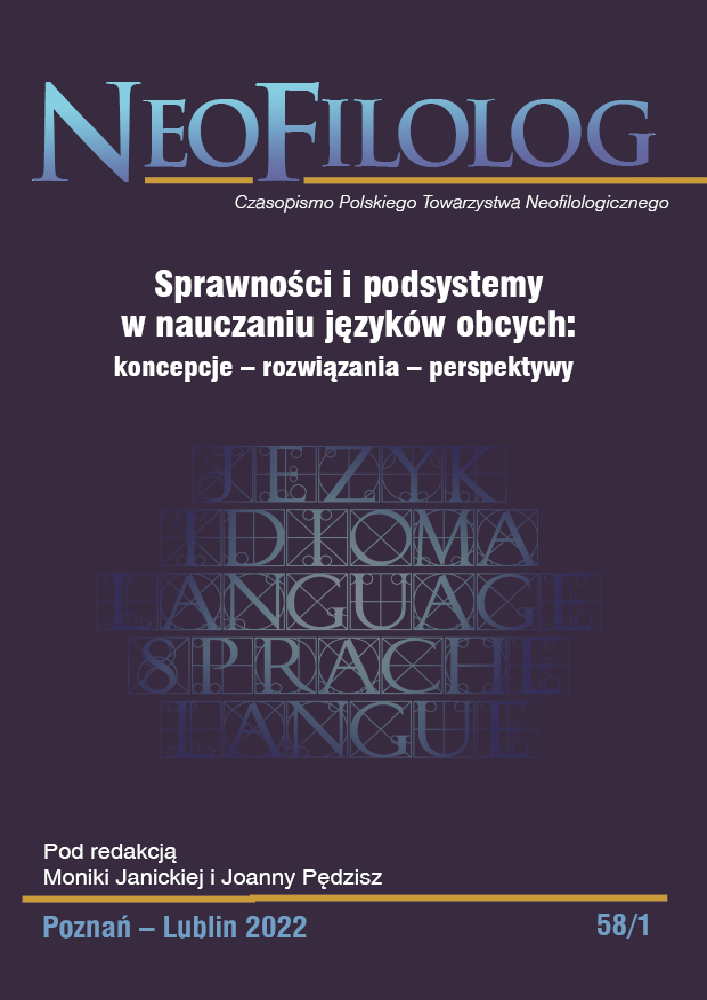Abstract
The role of the first foreign language in second foreign language learning is an interesting research question.
The main purpose of the research was to relate if and how the learners make deductions about German grammar based on English language skills. Therefore, this study presents the results of a survey conducted among students of Applied Linguistics who learn German after English. Participants were interviewed to state their opinion about the usefulness of English in learning German structures. The results of this inquiry allow the conclusions that learners use and transfer the previously acquired knowledge and information from what they have in first foreign language in order to understand, learn or form structures in the second foreign language. They compare both languages, look for similarities in the creation of the construction and the application of the structures or constructions, conclude by analogies between English and German in grammatical subsystem. In this way they deduce that English makes possible and facilitates to memorize grammatical forms while learning German, e.g. passive voice, articles, tenses, irregular verbs, comparative and superlative adjectives.
References
Bawej I. (2013), W jaki sposób język angielski może ułatwić proces nauki języka niemieckiego na poziomie zaawansowanym? (Raport z badań własnych). „Neofilolog”, nr 40/1, s. 15–28.
Bawej I. (2016), Nauka leksyki w języku obcym na przykładzie transferu pozytywnego języka polskiego, angielskiego i niemieckiego. „Linguodidactica”, t. XX, s. 9–24.
Chlewiński Z. i in. (1995), Wnioskowanie przez analogię w procesach kategoryzacji. Psychologiczne badania biologów, fizyków i humanistów. Lublin: Towarzystwo Naukowe Katolickiego Uniwersytetu Lubelskiego.
Decke-Cornill H., Küster L. (2010), Fremdsprachendidaktik. Tübingen: Narr Verlag.
Doyle A. C. (2017), Przygody Sherlocka Holmesa. Wydawnictwo: Algo.
Europejski system opisu kształcenia językowego: uczenie się, nauczanie, ocenianie. 2003. Warszawa: Wydawnictwo Centralnego Ośrodka Kształcenia Nauczycieli. Wydanie 1.
Izdebska-Długosz D. (2016), Uczyć się czy nie uczyć? – Przemiany miejsca i roli gramatyki w świetle metod nauczania języków obcych. „Acta Humana”, nr 7, s. 93–103.
Komorowska H., Obidniak D. (2002), Stopień po stopniu. Rozwój zawodowy nauczyciela języków obcych. Warszawa: Wydawnictwo Naukowe PWN.
Kujawa B. (2003), Język niemiecki jako drugi język obcy. „Języki Obce w Szkole”, nr 1, s. 35–39.
Michońska-Stadnik A. (1996), Strategie uczenia się i autonomia ucznia w warunkach szkolnych. Wrocław: Wydawnictwo Uniwersytetu Wrocławskiego.
Oxford R. (1990), Language Learning Strategies. What every teacher should know. New York: Newbury House.
Rampillon U. (1995), Lerntechniken im Fremdsprachenunterricht. München: Hueber.
Schlak T. (2003), Grammatik induktiv oder deduktiv vermitteln? Zielgruppenorientierte Methodikforschung an einem konkreten Beispiel veranschaulicht, (w:) Eckerth J. (red.), Empirische Arbeiten aus der Sprachlehrforschung. Beiträge des Hamburger Promovierendenkolloquiums SLF. Bochum: AKS Verlag, s. 81–96.
Schönpflug U. (1995), Lerntheorie und Lernpsychologie, (w:) Bausch K. i in. (red.), Handbuch. Fremdsprachenunterricht. Tübingen: Francke Verlag, s. 81–96.
Słownik łacińsko-polski (1986), opracował K. Kumaniecki, Warszawa: Państwowe Wydawnictwo Naukowe.
Szarska-Wieruszewska J. (2004), Lernerstrategien als Grundlage der lerntypischen Fehlerbehandlung. Forschungsstudien am Beispiel der Deutsch lernenden polnischen Studenten. Hamburg: Verlag Dr. Kovač.
Szulc A. (1994), Słownik dydaktyki języków obcych. Warszawa: Wydawnictwo Naukowe PWN.
Targońska J. (2002), Nauczanie języka niemieckiego jako drugiego języka obcego. Charakterystyka, specyfika, wady i zalety nauczania niemieckiego po angielskim. „Języki Obce w Szkole”, nr 3, s. 30–37.
Tobiasz L. (2009), Język angielski w procesie uczenia się języka niemieckiego – pomoc czy przeszkoda? Krytyczna analiza ankiet przeprowadzonych wśród studentów anglistyki Uniwersytetu Śląskiego w grupach tłumaczeniowych z językiem niemieckim. „Neofilolog“, nr 33, s. 257–268.
Tönshoff W. (1995), Lernstrategien, (w:) Bausch K. i in. (red.), Handbuch. Fremdsprachenunterricht. Tübingen: Francke Verlag, s. 240–243.
Wach A., Jakowlewa-Pawlak M. (2016), Ocena użyteczności języka ojczystego (polskiego) w uczeniu się gramatyki języków obcych (angielskiego i rosyjskiego): wyniki badania. „Studia Rossica Posnaniensia”, vol. XLI, s. 473–485.
Wiese H. (1994), Integration des Transfers in eine Theorie des Zweitspracherwerbs. „Info DaF21”, 4, s. 397–408.
Zawadzka E. (2004), Nauczyciele języków obcych w dobie przemian. Kraków: Oficyna Wydawnicza „Impuls”.
NETOGRAFIA
Budziak R. (2013), Gramatyka w nauczaniu i uczeniu się języków obcych: spojrzenie na historie i współczesność. „Studia Germanica Gedanensia”, nr 29, s. 249–258. https://czasopisma.bg.ug.edu.pl/index.php/SGG/article/view/1528. [DW 5.04.2021].
Gwiasda D. (2015), Hält sie, was sie verspricht? – Induktive Grammatikeinführung in der Spracherwerbsphase des Lateinunterrichts aus empirischer Sicht. Dissertation. Göttingen. Doktorarbeit. Publikation. Inhaltsverzeichnis. https://ediss.uni-goettingen.de/handle/11858/00-1735-0000-0022-6077-A [DW 6.04.2021].
https://karrierebibel.de/ [DW 30.03.2021].
Łuczyński E. (2010), Akwizycja gramatyki języka polskiego, (w:) Psychologia rozwojowa, T. 15, nr 1, s. 9–18. http://cejsh.icm.edu.pl/cejsh/element/bwmeta1.element.ojs-issn-2084-3879-year-2010-volume-15-issue-1-article-661. [DW 29.03.2021].
Riehme J. (1986), Induktives und deduktives Vorgehen. http://www.fachdidaktik-einecke.de/3_Sprachdidaktik/induktiv_deduktiv_riehme.htm [DW 6.04.2021].
License
Copyright (c) 2022 Izabela Bawej

This work is licensed under a Creative Commons Attribution-NoDerivatives 4.0 International License.
Authors
Authors of texts accepted for publication in Neofilolog are required to complete, sign and return to the Editorial team’s office the Agreement for granting a royalty-free license to works with a commitment to grant a CC sub-license.
Under the agreement, the authors of the texts published in Neofilolog grant Adam Mickiewicz University in Poznań a non-exclusive, royalty-free license and authorize the use of Attribution-NoDerivatives 4.0 International (CC BY-ND 4.0) Creative Commons sub-license.
The authors retain the right to the free disposal of the work.
Users
Interested Internet users are entitled to use works that have been published in Neofilolog since 2017, under the following conditions:
▪ attribution – obligation to provide, together with the distributed work, information about the authorship, title, source (link to the original work, DOI) and the license itself.
▪ no derivatives – the work must be preserved in its original form. Without the author's consent, it is not possible to distribute the modified work in the form of translations, publications, etc.
Copyrights are reserved for all texts published since 2017.
Miscellaneous
Adam Mickiewicz University in Poznań retains the property right as a whole (layout, graphic form, title, cover design, logo etc.).

